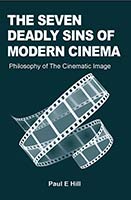This book is a philosophy of cinema. Its essential message is simple: too many recent films (especially in serious cinema) are inferior because too many of their creators have abandoned too many well tried cinematic techniques in favour of a dulled down pursuit of raw naturalism, something too often contentiously thought of as 'authenticity', 'realism' and 'immediacy'. Cinematic art, it is argued, is ignored because it is too often mistakenly seen as irrelevant to issues and humanity - an unnecessary, and perhaps overly difficult and demanding, adornment that smothers what really matters. Hill attempts to make a reasoned case against these profound errors. It proceeds by examining the very nature of the cinematic image and showing the really deep psychological and even spiritual impact and insight such imagery can possess when its potential is imaginatively exploited. While embracing change, the book argues that cinematic 'form' is of first importance if humanity and its conditions are to be explored in much needed depth. Its conclusion: if the issue matters, so must the art. Put it this way: realism needs artistry, and deep realism needs deep artistry.
|
||||||||||||||||||||||||||||||||||||||||||||||||||||||||||||||||||||||||||||||||||||||||||||||




